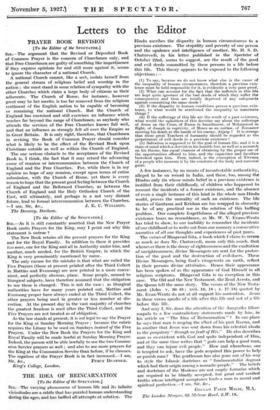1ki14, IDEA OF REINCARNATION
[To the Editor of the SPECTATOR.] SIR;—The varying phenomena of human life and its infinite vicissitudes are a riddle that has puzzled human understanding during the ages, and has baffled all attempts at solution. The
Hindu ascribes the disparity in human circumstances to a previous existence. The stupidity and poverty of one person and the opulence and intelligence of another, Mr. H. S. D. Chaturvedi, in his letter published in the Spectator of October 22nd, seems to suggest, are the result of the good and evil deeds committed by these persons in a life before this life. This theory appears to be exposed to the following objections :-
(1) To say, because we do not know what else is the cause of the inequality of human circumstances, therefore a previous exis- tence must be held responsible for it, is evidently a very poor laroof.
(2) What can account for the fact that the sufferers in this life are kept quite ignorant of the bad deeds of which they suffer the consequences and thus are totally deprived of any safeguards against committing the same deeds ?
(3) If the disparity in human conditions proves a previous exis- tence, to what would be attributed the inequality in inanimate things ?
(4) If the sufferings of this life are the result of a past existence, what would the upholders of this doctrine say about the sufferings of Jesus on the Cross, of Rama in banishment, of Mohammed in flight, of Joseph in captivity, of Moses as an outlaw, of Zoroaster meeting his death at the hands of his enemy, Arjasp ? It is strange that these great Teachers of humanity should be regarded as the perpetrators of evil deeds in a previous existence !
(5) Salvation is supposed to be the goal of human life, and it is a state of mind which a dervish in his humble hut, as well as a monarch on his throne, has equal chances of obtaining by the proper use of the opportunities offered to him, and the capacities and faculties bestowed upon him. Poor, indeed, is the conception of Nirvana of a people who measure it by the comforts of the body and material gains.
A few instances, by no means of incontestable authenticity, alleged to be on record in India, and these, too, among the Hindus only (in whose minds belief in a previous existence is instilled from their childhood), of children who happened to recount the incidents of a former existence, and the absence of even a single instance of this kind in the whole non-Hindu world, proves the unreality of such an existence. The life stories of Gautama and Krishna are too wrapped in obscurity to be of any practical use in the solution of this baffling problem. Our complete forgetfulness of the alleged previous existence bears no resemblance, as Mr. W. Y. Evans-Wentz has tried to show, to our inability to remember the incidents of our childhood or to write out from our memory a consecutive narrative of all our thoughts and experiences of past years.
The verses of Bhagavad Gita, a book which I claim to revere as much as does Mr. Chaturvedi, mean only this much, that whenever there is the decay of righteousness and the exaltation of unrighteousness, divine Messengers are sent for the protec- tion of the good and the destruction of evil-doers. These Divine Messengers, being God's vicegerents on earth, reflect in their persons divine attributes. Hence their appearance has been spoken of as the appearance of God Himself in all religious scriptures. Bhagavad Gita is no exception in this case. The Old and the New Testament, the Zend Avesta, and the Quran tell the same story. The verses of the New Testa- ment (John v. 30-43 ; xvii. 16, 18 ; x. 17-18) quoted by Mr. Evan-Wentz do not at all support his contention. Jesus in these verses speaks of a life after this life and not of a life before this life.
And may I, Sir, draw the attention of the Anagarika Dhar-
mapala to a few contradictory statements made by him, in his article on " The Idea of Reincarnation " ? In one place he says that man is reaping the effect of his past Karma, and in another that Jesus was sent down from his celestial abode to the purgatory " through no fault of His." He also describes man as co-existent with God and quite independent of Him, and at the same time writes that " gods can help a good man, and they can injure evil people." How and wherefrom, one is tempted to ask, have the gods acquired this power to help or punish man? The gentleman has also gone out of his way to style the Islamic doctrines as " fundamentalist dogmas which had their origin among a nomadic people." The beliefs and doctrines of the Moslems are not empty formulas which are required to be blindly accepted, but great and verified truths whose intelligent acceptance leads a man to moral and spiritual perfection.--I am, Sir, &e., CMUT.AM P.ARID MALIK, M.A.
The London Mosque, 63 Melrose Road, S. W. 18.


















































 Previous page
Previous page